
Peter Paul Cetera is a retired American musician best known for being a frontman, vocalist, and bassist for the American rock band Chicago from 1967 until his departure in 1985. His career as a recording artist encompasses 17 studio albums with Chicago and eight solo studio albums.

Chicago 16 is the thirteenth studio album by the American rock band Chicago, released on June 7, 1982. It is considered their "comeback" album because it was their first album to go platinum since 1978's Hot Streets. It made it into the Billboard 200 top ten, and produced their second number one single in the United States, "Hard to Say I'm Sorry." The album was certified gold by the Recording Industry Association of America (RIAA) in August, 1982, two months after its release, and platinum in December, 1982. "Hard to Say I'm Sorry" was nominated for a Grammy Award for Best Pop Performance by a Duo or Group with Vocal.

"Hard to Say I'm Sorry" is a 1982 power ballad by the group Chicago. It was written by bassist Peter Cetera, who also sang the lead vocals on the track, and producer David Foster. It was released on May 17, 1982, as the lead single from the album Chicago 16. On September 11 it reached No. 1 for two weeks on the Billboard Hot 100. It was the group's second No. 1 single. It was their first top 50 hit since "No Tell Lover" in 1978 and it spent twelve weeks in the top 5 of the Billboard Hot 100. The single was nominated for a Grammy Award for Best Pop Performance by a Duo or Group with Vocal, and was certified gold by the Recording Industry Association of America (RIAA) in September of the same year. Songwriter Cetera, a member of the American Society of Composers, Authors and Publishers (ASCAP), won an ASCAP Pop Music Award for the song in the category, Most Performed Songs.
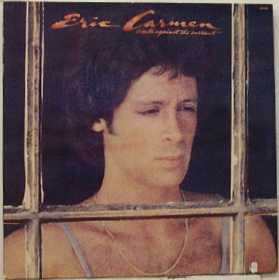
Boats Against the Current is a 1977 album by Eric Carmen. The title is taken from a line in the novel The Great Gatsby by F. Scott Fitzgerald, “So we beat on, boats against the current, borne back ceaselessly into the past.” It was Carmen's second solo LP, after the Raspberries disbanded. It peaked at #45 on the Billboard 200 for the week ending October 8, 1977.
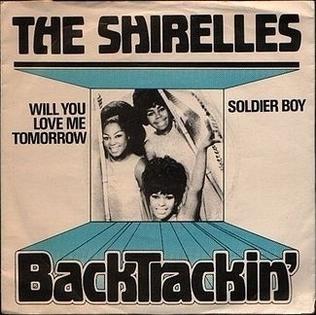
"Will You Love Me Tomorrow", sometimes known as "Will You Still Love Me Tomorrow", is a song with words by Gerry Goffin and music composed by Carole King. It was recorded in 1960 by the Shirelles at Bell Sound Studios in New York City, and hit number one on the Billboard Hot 100 chart. The song was the first by an African-American all-girl group to reach number one in the United States. It has since been recorded by many other artists including a 1971 version by co-writer Carole King.

"You Send Me" is a song written and originally recorded by American singer Sam Cooke, released as a single in 1957 by Keen Records. Produced by Bumps Blackwell and arranged and conducted by René Hall. The song, Cooke's debut single, was a massive commercial success, becoming a No. 1 hit on both Billboard's Rhythm & Blues Records chart and the Billboard Hot 100.

Songs is the ninth studio album by American R&B/soul singer-songwriter Luther Vandross. It was released by Epic Records on September 20, 1994. The album, a collection of cover versions, produced the singles "Endless Love", "Always and Forever", and "Ain't No Stoppin' Us Now". According to an interview both Vandross and Mariah Carey gave in Japan following the release of their duet "Endless Love", there was mention that Carey had given advice as to what songs Vandross would cover on this album.

"Love's Been A Little Bit Hard On Me" is a song written by Gary Burr and recorded by the American country-pop singer Juice Newton for her album Quiet Lies. The recording garnered Newton a Grammy nomination for Best Female Vocalist in the Pop category.

"Glory of Love" is a 1986 song performed by Peter Cetera, which he wrote and composed with his then-wife Diane Nini and David Foster. The song was recorded by Cetera shortly after he left the band Chicago to pursue a solo career. Featured in the film The Karate Kid Part II (1986), it was Cetera's first hit single after he left the band, reaching number one on the Billboard Hot 100, and it was included on his album Solitude/Solitaire (1986), which Michael Omartian produced.

"The Next Time I Fall" is a song written by Bobby Caldwell and Paul Gordon and recorded by a duet of Peter Cetera and Amy Grant for Cetera's 1986 album Solitude/Solitaire. It reached number one on Billboard magazine's Hot 100 and Adult Contemporary chart and was nominated for a Grammy Award for Best Pop Performance by a Duo or Group with Vocals. In February 2020, it was listed on a Billboard pop music list of top 25 love song duets.

"(I've Been) Searchin' So Long" is a song written by James Pankow for the group Chicago and recorded for their album Chicago VII (1974). The first single released from that album, it reached number 9 on the U.S. Billboard Hot 100. It also hit number 8 on the Adult Contemporary chart. In Canada, the song peaked at number 5.

"Wishing You Were Here" is a song written by Peter Cetera for the group Chicago and recorded for their album Chicago VII (1974), with lead vocals by Terry Kath, while Cetera sang the song's bridge. The third single released from that album, it reached No. 11 on the U.S. Billboard Hot 100, No. 9 on the Cash Box Top 100, and hit No. 1 on the Easy Listening chart.

"Baby, What a Big Surprise" is a ballad written by Chicago's then bassist/singer Peter Cetera, which appeared on their album Chicago XI (1977), with Cetera singing lead vocals. The first single released from the album reached number 4 on the US Billboard Hot 100 chart.
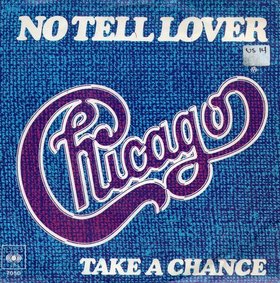
"No Tell Lover" is a song written by Lee Loughnane, Danny Seraphine, and Peter Cetera for the group Chicago and recorded for their album Hot Streets (1978), with Cetera and Donnie Dacus singing lead vocals. The second single released from that album, it reached No. 14 on the U.S. Billboard Hot 100 chart and No. 5 on the adult contemporary chart.

"Hard Habit to Break" is a song written by Steve Kipner and John Lewis Parker, produced and arranged by David Foster and recorded by the group Chicago for their 1984 album Chicago 17, with Bill Champlin and Peter Cetera sharing lead vocals. Released as the second single from the album, it reached No. 3 on the Billboard Hot 100 and was prevented from charting higher by "Caribbean Queen" by Billy Ocean and "I Just Called to Say I Love You" by Stevie Wonder. "Hard Habit to Break" also peaked at No. 3 on the Adult Contemporary chart. The lyrics of the song appear to describe a man having a hard time getting over a significant other getting away after he took her for granted and she left him for someone else. Overseas it peaked at No. 8 on the UK Singles Chart.
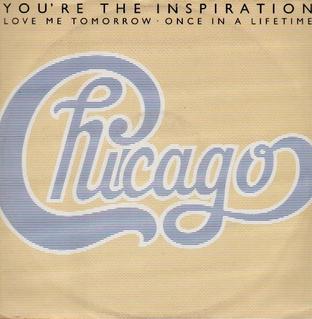
"You're the Inspiration" is a song written by Peter Cetera and David Foster for the group Chicago and recorded for their fourteenth studio album Chicago 17 (1984), with Cetera singing lead vocals. The third single released from that album, it reached No. 3 on the US Billboard Hot 100 chart in January 1985 and also climbed to the top position on the Adult Contemporary chart at the same time. The song won honors for Cetera from the American Society of Composers, Authors and Publishers (ASCAP), in 1986 in the most-performed songs category.

"Will You Still Love Me?" is a song recorded by the American rock band Chicago for their studio album Chicago 18 (1986). The song was written by David Foster, Tom Keane and Richard Baskin.

"Who Loves You" is the title song of a 1975 album by The Four Seasons. It was composed by Bob Gaudio and Judy Parker and produced by Gaudio. It reached number 3 on the Billboard Hot 100 in November 1975.
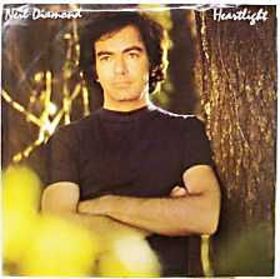
"Heartlight" is a song written by Neil Diamond, Carole Bayer Sager and her then-husband, Burt Bacharach, and recorded by Diamond in 1982. It is the first track on Diamond's 1982 album, also titled Heartlight, and reached number five on the Billboard Hot 100, becoming his thirteenth top 10 hit on the chart. It also spent four weeks atop the adult contemporary chart in late 1982, and was the last of his eight #1s on that chart. Reportedly, it was inspired by the 1982 film E.T. the Extra-Terrestrial, and Diamond allegedly settled with MCA/Universal for $25,000, due to its supposedly drawing on the material of the film.
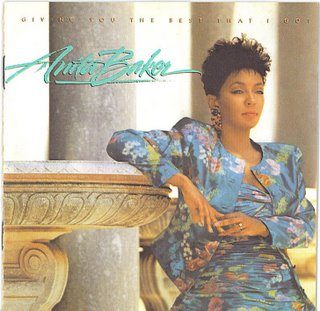
Giving You the Best That I Got is the third album by American R&B/soul singer Anita Baker, released in 1988. It was Baker's first and only #1 Pop album in the US, her second #1 R&B Album, and was certified 3x platinum in 1989 by the RIAA. The title track was released as the first single from the album and became Baker's highest-charting single in the US, peaking at #3 on the Billboard Hot 100. The album earned Baker three Grammy Awards and three Soul Train Music Awards.




















